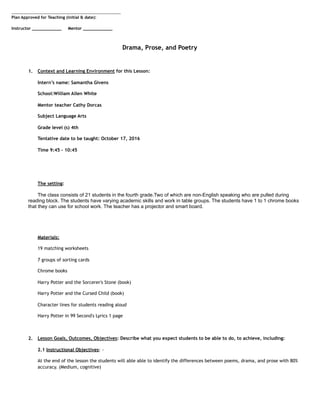The document outlines a lesson plan for teaching 4th grade students about the differences between drama, prose, and poetry using examples from the Harry Potter book series. The lesson includes reading excerpts from Harry Potter books aloud, a vocabulary sorting activity in small groups, an independent matching worksheet assessment, and a closing discussion to review the key differences between drama, prose and poetry. The goal is for students to be able to identify the genre of a work with 80% accuracy.



